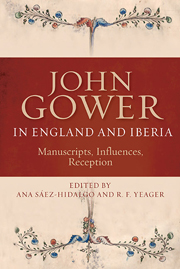Book contents
- Frontmatter
- Contents
- List of Illustrations
- Abbreviations
- Introduction
- I Manuscripts
- 1 Castilian Script in the Iberian Manuscripts of the Confessio Amantis
- 2 Provenance Interlacing in Spanish Royal Book-Collecting and the Case of the Confessio Amantis (RB MS II-3088)
- 3 Inglorious Glosses?
- 4 The Yale Gower Manuscript, Beinecke Osborn MS fa.1: Paleographical, Codicological, Technological Challenges and Opportunities
- II Iberia
- III The Classical Tradition
- IV Economy
- V Reception
- Notes on Contributors
- Bibliography
- Index
3 - Inglorious Glosses?
from I - Manuscripts
Published online by Cambridge University Press: 05 August 2014
- Frontmatter
- Contents
- List of Illustrations
- Abbreviations
- Introduction
- I Manuscripts
- 1 Castilian Script in the Iberian Manuscripts of the Confessio Amantis
- 2 Provenance Interlacing in Spanish Royal Book-Collecting and the Case of the Confessio Amantis (RB MS II-3088)
- 3 Inglorious Glosses?
- 4 The Yale Gower Manuscript, Beinecke Osborn MS fa.1: Paleographical, Codicological, Technological Challenges and Opportunities
- II Iberia
- III The Classical Tradition
- IV Economy
- V Reception
- Notes on Contributors
- Bibliography
- Index
Summary
“I will gloze with him …”
(Pericles, 1.1.111)The History of the Latin Gloss in Medieval English Literature would be a small book. It hasn't been written yet, and there's not much to write about, so anyone undertaking the task would inevitably produce a slim volume. What, then, if we broaden the scope of the inquiry, and think not in terms of specifically Latin glossing but rather of “vernacular glossing” or “vernacular commentary” – by which I mean the production of commentary, whether in Latin or in the vernacular, on a vernacular text? The British outlook remains rather barren, though one's eyes can pick out with pleasure the extensive Latin materials in copies of that most popular of all Middle English poems, The Prick of Conscience (but can they really be called “glosses,” as opposed to amplifications?), the occasional side-notes in some Chaucer manuscripts, the extensive Latin apparatus (mainly source-identifications) to Thomas Hoccleve's Regiment of Princes and to the anonymous Court of Sapience, the vernacular Aeneid commentary of which Gavin Douglas wrote only the beginning, and the English commentary devised by John Walton to accompany his Boethius translation (which – a point of some significance in itself – is extant in only one manuscript, while the other eighteen lack it). In this context the Latin glosses that, it is generally believed, Gower himself wrote for his Confessio Amantis and other works appear quite significant.
- Type
- Chapter
- Information
- John Gower in England and IberiaManuscripts, Influences, Reception, pp. 51 - 76Publisher: Boydell & BrewerPrint publication year: 2014

